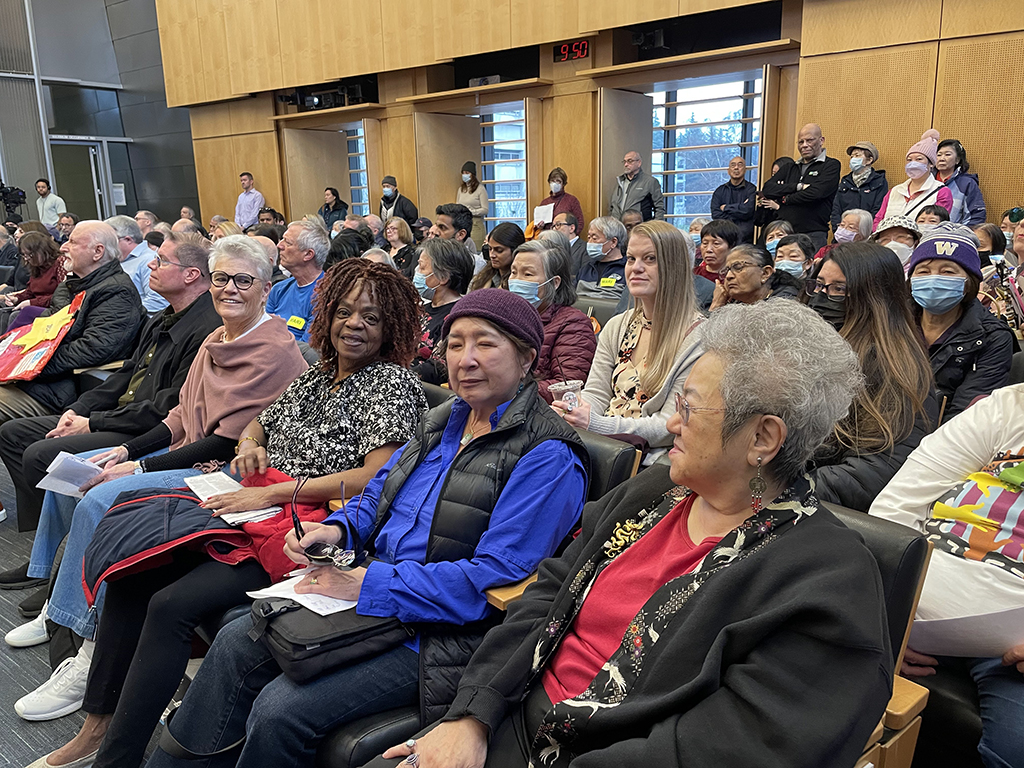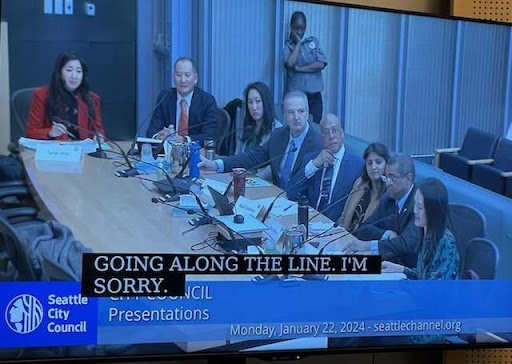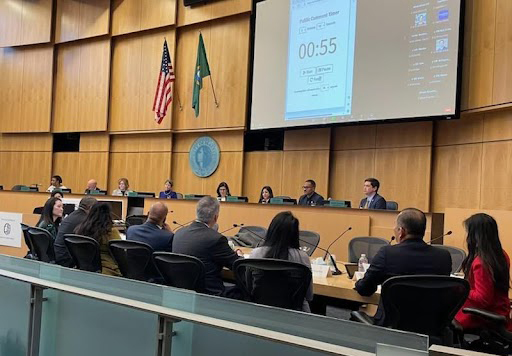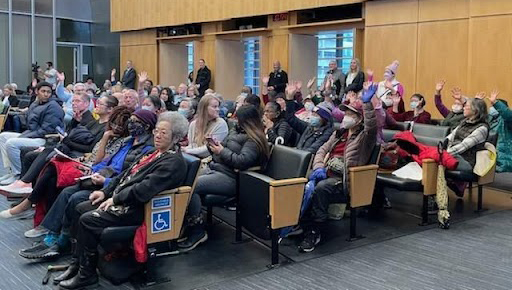By Mahlon Meyer
NORTHWEST ASIAN WEEKLY
Upon the moment it was her turn to speak, every candidate turned to look eagerly at Tanya Woo, who had been the subject of a media campaign that associated her with big business and positioned her as an enemy of labor unions. The campaign turned around an email recently sent by Tim Ceis, a political consultant to Mayor Bruce Harrell, that seemed to indicate that supporters of big business had “earned the right” to appoint the vacant council seat.

Supporters of Tanya Woo in the front row while at least 50 residents of the CID, also in favor of Woo, sit behind them (Photo by Assunta Ng)
Readers of the city’s various publications went ballistic. Many showed up for public comment calling for transparency and endorsing other candidates like Vivian Song, who had also been mentioned in the email, as a friend to unions.

A snafu occurred during candidates’ opening remarks with Vivian Song initially being passed by. From left: Tanya Woo, Linh Thai, Mari Sugiyama, Capt. Steven Strand, Mark Solomon, Neha Nariya, Juan Cotto, and Vivian Song.
“Tim Ceis has openly dishonored our colleagues,” said one public commenter. “Seattle,” said another, “is not a corporation.”
But in all the “media noise,” as Council President Sara Nelson described it, no one, it seemed, had ever questioned if the email had been meant as a strategic way to undermine Woo.
Skepticism about the email
After the special city council meeting this morning, some leaders of the Chinatown-International District (CID) were openly expressing skepticism about the actual intent of the email, which was widely distributed and leaked to the city’s major publications, at a point when Woo seemed to have had the nomination virtually locked up.
Woo, herself, refused to address the email head on, just as she had ignored earlier hit pieces against her.
In an interview yesterday with Northwest Asian Weekly, she said she wanted to focus on a “higher plane” and avoid divisive politics.
Candidates close on public safety?
Nelson, at the close of today’s meeting, seemed to hit on a similar theme.
She hoped the council would continue to remain committed to “resetting the tone,” an agenda that voters have endorsed. Addressing the email, she called it “guilt by manufactured association.”
Given that the other council members had only recently been out on the campaign trail, she said, “I trust my colleagues to rise above that noise.”
As if to prove that all candidates would follow through on a new mandate for public safety—compared to past council members who had supported defunding the police and other measures—Nelson asked a question that would have distinguished any candidate: How would they have voted on the bill to criminalize open-air drug use?
Every candidate indicated they would have voted yes.
Unions
While Woo did not address the email directly, she did say she was “thrilled” to work with unions. And Councilmember Cathy Moore, after peppering candidates with one policy question after another, said, “Last but not least, would you be a strong advocate for labor?”
Every candidate, including Woo, held up a “YES” paddle.

Candidates in a lightning round hold up signs, with Tanya Woo to the far left and Vivian Song to the far right (Photo by Assunta Ng)
It was not immediately clear if she were trying to give Woo a chance to redeem herself.
“Multi-ethnic” support
Observers from the CID said Woo was the only candidate who had “multi-ethnic support.”
Dawn Mason, a former state representative, made a public comment in support of Woo.
“We asked for help with 12th and Jackson, and she stepped up to help. It is now a calmer place.”
The leader of a food bank in Rainier Valley said Woo was “steadfast.”
Jim Buchanan, representing King County Equity Now, said, “We fully support Tanya Woo to do the right thing for the Black community.”
Meanwhile, residents of the CID came out en masse to fill the back sections of the council chambers to support Woo, with several speaking in Cantonese, then translating for the crowd.
Woo seemed to appeal to the creative and innovative.
Julie Riles, a CID resident, using figurines to illustrate the various years in the Chinese astrological calendar, read a haiku she had written about Woo.
“Emerald City
Sage Wood Dragon
Turquoise Gem
She is Aloha
Vote for Tanya Woo.”
Forceful answers but avoiding “divisive politics”
But community leaders from the CID have asked: What evidence is there that Woo ever took money from special interests or big business?
Indeed, in the interview yesterday with the Northwest Asian Weekly, Woo was willing to respond forcefully to the insinuations made by the media about the email.
Her answers to direct questions posed by this reporter included the following statements:
“I represent everybody.”
“I cannot be bought.”
“No one owns me.”
“I speak for myself, no one who writes emails speaks on my behalf.”
“I came from Beacon Hill and worked after school in my family’s bakery.”
But again, when asked at the close of the interview if she were planning to say any of these things during her statement the following day, she talked about avoiding divisive politics.
Even when pressed, and asked about her martial arts training, and wouldn’t she even use the momentum of an opponent’s attack to let that carry whomever it was off balance, she returned to saying she wanted to focus on the issues.
A gambit?
Political observers have said the emergence of the e-mail over the past week may have ruined her chances of getting the appointment after many, if not most, council members seemed to support her as a top choice.
But what if the email were a ruse, intentionally put out there to sabotage her?
This was the question communicated to the Northwest Asian Weekly after the council meeting.
Ceis, who is known in the media as “the shark,” is known for his extremely wily moves, and this may have been a strategic gambit, said one longtime community advocate, who asked not to be named to jeopardize work with the city government on behalf of a historically marginalized community.
Indeed, a scrutinizing review of the email raises the question if such a longtime political operative would publicly write lines that seemed to grant the business lobby ownership over the political process, particularly given the lingering history of leaks in Seattle politics.
For instance:
“I don’t believe all of you worked so hard and gave so much to let unions and the left decide who gets this seat,” Ceis wrote.
Or:
“The independent campaign expenditure success earned you the right to let the Council know not to offer the left the consolation prize of this Council seat.”
(Ceis did not immediately respond to a request for comments.)
As PubliCola reported last year, Ceis was granted a $300,000 contract by Harrell. Harrell, while endorsing a number of candidates, did not endorse Woo.
A new mood in the council chambers
In one way or another, many of the other candidates seemed to pick up on the prevailing mood of the media campaign and emphasize aspects of their portfolios or experiences that identified themselves with the weaker or the victimized—in other words, distancing themselves from the powerful, that Ceis and his cronies seem to represent.
Neha Nariya began by talking about being a first-generation immigrant. Vivian Song started her remarks by calling attention to her physical disability of being hard of hearing. Mari Sugiyama mentioned the incarceration of her grandparents and that her husband had lost work as a member of the gig economy.
Linh Thai, on the other hand, took the reverse position from his personal revelations during a recent forum and shared his prestigious military record.
Mark Solomon said his position came down to “customer service.”
Steve Strand came out with a different strategy altogether, seeming to allude to fears in the city of an evaporating police force.
Seeming to attempt to distinguish himself from other candidates on public safety, his undertones were vaguely reminiscent, perhaps, of a decade earlier when Seattle had recently gone under a federal consent decree and officers were accused by the federal monitor of practicing “depolicing,” holding back on doing their jobs when reforms introduced controls over their use of force.
At the time, the federal monitor said the Seattle Police Officers Guild was holding the city “hostage” for more benefits. While there is no direct correlation, Strand seemed to be contending his appointment to the council would prevent any further deterioration in public safety.
“We are still losing more police officers than we are adding,” he said, arguing that his selection would turn that danger to the city and its residents around.
In the end, Woo did respond obliquely to the disastrous email and its media amplification.
“I am thrilled to cooperate with unions,” she said. “I always have and will continue to represent everyone.”
However, she mostly returned to her main themes of “amplifying voices of the underserved.”
And, broaching a theme she rarely talked about, she specifically referred to directly saving the lives of those experiencing homelessness.
“I’ve knelt on the street administering CPR and Narcan,” she said.
Still, at the end, as she sank back into her chair, she could not, it seemed, wipe a look of defeat—or hurt—from her face.
Strengths and weaknesses
Serving on the city council is not rocket science, political veterans say. Council members previously were allowed to hire two staff members, if they were wise, who could shore up any area in which they were weak. Today, a council member can hire four staff members.
Public comment seemed to call attention to both areas of potential weakness and strengths.
Supporters of each candidate seemed to center around certain themes, almost as if remarks had been scripted—or their candidate branded.
Thus, Woo was described time and again as someone with heart, who showed up, who got things done.
Song was described as someone—indeed, as a former investment banker—who had the budget skills to help the council with its deficit. In addition, she was “not pressured by big business,” said one supporter.
Sugiyama as someone with intimate knowledge of the city and the community.
Strand as a trustworthy leader who had served in both the military and police who could convey exactly what the police were thinking.
Solomon as someone who gets things done—a “workhorse.”
Nariya as a responsible small business owner who personally cared about those suffering from trauma.
And Thai as someone who was “dedicated and hardworking” and would protect “working renters.”
Mahlon can be reached at info@nwasianweekly.com.






What is this look here
Very incisive research and reporting.
When Tim Ceis responds to NW Asian Weekly inquiries for comment, please publish the Q&A with him. Many of us are very curious about what he has to say, in view of the fact he has never met with or spoken to CM Tanya Woo prior to her appointment or after. If Tim Ceis has nothing to hide, surely he will respond to explain his actions.
There is no mention of candidate Juan.